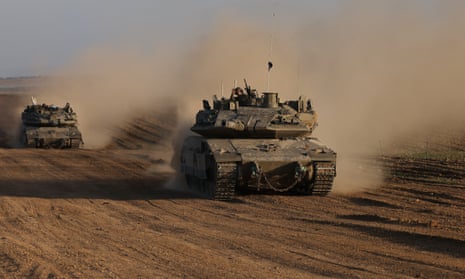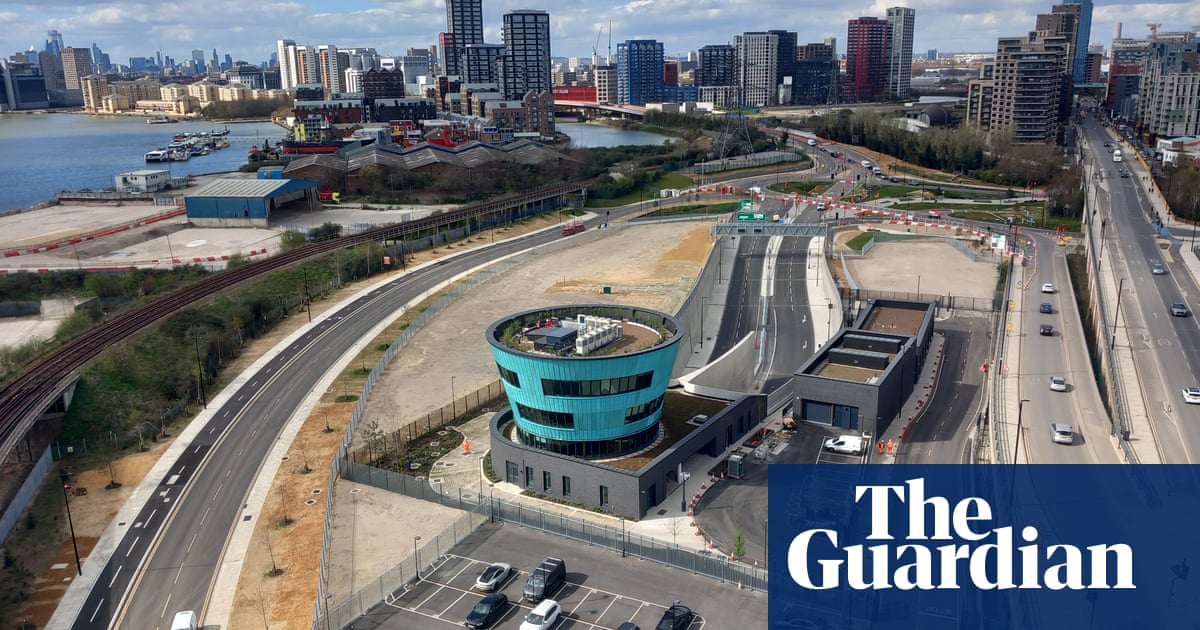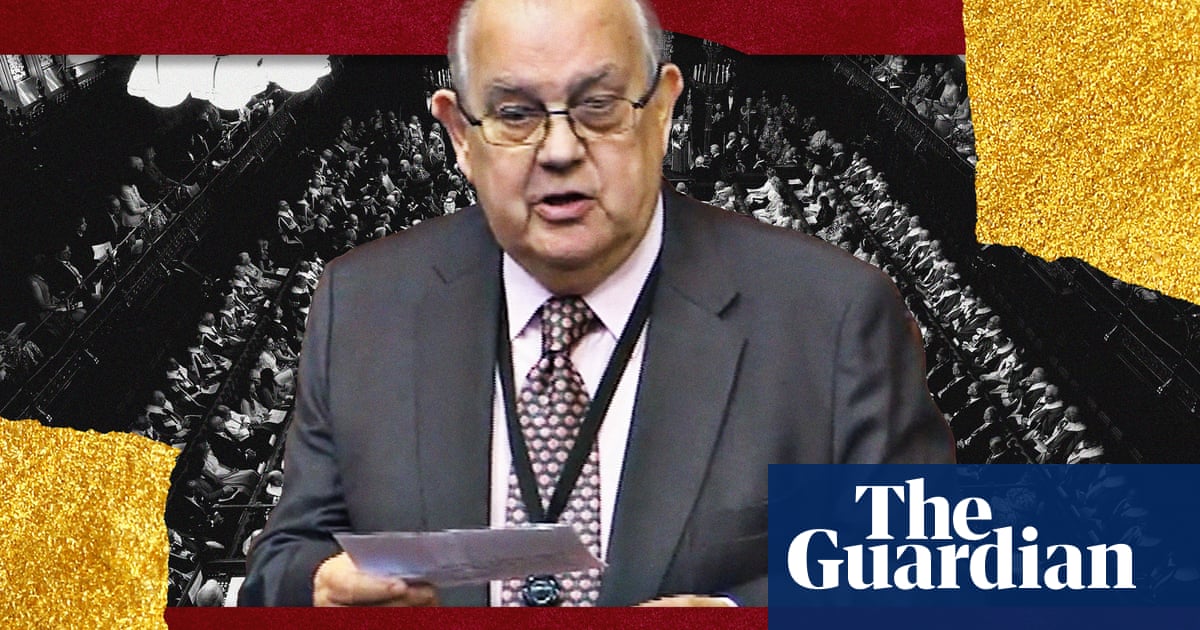
A Palestinian woman mourns next to the bodies of loved ones killed in Israeli air strikes on Gaza City earlier this month. Photograph: Omar Al-Qattaa/AFP/Getty Images
Show key events only Please turn on JavaScript to use this feature
Live feed
Israel’s defence minister says his country’s forces will be free to act in the Gaza Strip even after war ends
We are restarting our coverage of the ongoing crisis in the Middle East, with Israel’s war on Gaza continuing and the Syrian rebel groups scrambling to form a transitional government in the wake of the fall of the Assad regime.
Israel’s defence minister, Israel Katz, has said his country’s forces will maintain “security control” over the devastated Gaza Strip, even after the war is over, with Israeli soldiers able to act with “full freedom of action” over the territory.
In a post on X, Katz, the former foreign minister, said:
After we defeat Hamas’ military and governmental power in Gaza, Israel will have security control over Gaza with full freedom of action, just as it did in Judea and Samaria (an Israeli term for the occupied West Bank).
We will not allow any terrorist organization against Israeli communities and Israeli citizens from Gaza. We will not allow a return to the reality of before October 7th.
The question of Gaza’s postwar governance has remained unresolved, a year after the 7 October 7 Hamas-led attack, in which about 1,200 people were killed and 250 taken hostage.
Katz’s predecessor Yoav Gallant, who was sacked in November, was opposed to any prolonged Israeli control of Gaza, from which Israel withdrew troops and settlers in 2005 after decades of direct rule. Hamas seized full control of Gaza in 2007.
In May, then as defence minister, Gallant said that he would “not agree to the establishment of an Israeli military administration in Gaza”. “Israel must not have civilian control over the Gaza Strip,” Gallant said at the time, urging the country’s prime minister, Benjamin Netanyahu, to devise a postwar plan for the territory.

In other developments:
-
The head of the International, Impartial and Independent Mechanism, a UN investigative body, has written to Syria’s new authorities to express a willingness to engage with them and to travel to Syria to secure evidence that could implicate top officials of the former government. “There is now the possibility of accessing evidence of the highest level of (the) regime,” he said. The comments come after the head of a US-based Syrian advocacy organization on Monday said that a mass grave outside Damascus contained the bodies of at least 100,000 people killed by the former government of ousted President Bashar al-Assad.
-
German diplomats will hold their first talks with representatives of Hayat Tahrir al-Sham (HTS) in Damascus today, focusing on a transitional process for Syria and the protection of minorities, the German foreign ministry said. France, a key early backer of the uprising, also sent a delegation to the Syrian capital on Tuesday, with special envoy Jean-Francois Guillaume saying his country was preparing to stand with Syrians during the transitional period. Italian prime minister Giorgia Meloni, meanwhile, said her country was ready to engage with Syria’s new leadership after the overthrow of Bashar al-Assad, but urged caution. The US state department said on Monday that the American government has had more than one communication with HTS over the past week.
-
US president-elect Donald Trump characterised the ousting of Assad as an “unfriendly takeover” by Turkey, which has historically backed the opposition. “I think Turkey is very smart … Turkey did an unfriendly takeover, without a lot of lives being lost. I can say that Assad was a butcher, what he did to children,” Trump told reporters at his residence in Florida.
-
Ahmed al-Sharaa, the leader of the HTS group that toppled Syrian president Bashar al-Assad, said all rebel factions would “be disbanded and the fighters trained to join the ranks of the defence ministry” during a meeting with members of the Druze community. He stressed the need in a meeting with a delegation of British diplomats to end “all sanctions imposed on Syria so that Syrian refugees can return to their country”. The UK, along with other western countries, considers HTS to be a terrorist organisation, though this designation may soon change.
-
The US military on Tuesday said it bombed a Houthi military facility in Yemen’s capital, Sanaa, in what was the latest US-led attack on the Iranian-backed rebels. The Houthi media office said the airstrike hit part of the sprawling complex that houses the rebels’ defense ministry. There were no immediate reports of casualties. US Central Command said the strike late yesterday evening targeted a key command and control facility that was “a hub for coordinating Houthi operations,” including attacks on US navy and merchant vessels in the Red Sea and Gulf of Aden.
Key events Show key events only Please turn on JavaScript to use this feature
Reuters has been told by sources that Syria has only a small amount of foreign currency reserves in cash.
Here is an extract from the Reuters report:
Syria’s gold reserves stood at 25.8 tons in June 2011, according to the World Gold Council, which cites the Central Bank of Syria as its data source. That is worth $2.2bn at current market prices, according to Reuters calculations.
The central bank’s foreign exchange reserves amount, however, to just around $200m in cash, one of the sources told Reuters, while another said the US dollar reserves were “in the hundreds of millions”.
While not all reserves would be held in cash, the drop is substantial compared with before the war. At the end of 2011, Syria’s central bank reported $14bn in foreign reserves, according to the International Monetary Fund. In 2010, the IMF had estimated Syria’s foreign reserves to stand at $18.5bn.
The dollar reserves have been nearly depleted because the regime increasingly used them to fund food, fuel and Assad’s war effort, current and former Syrian officials have told Reuters.
Israeli airstrike in Gaza kills at least 8 people from the same family, medics say
An Israeli airstrike in Gaza killed at least eight people from the same family, most of them women and children, Palestinian medics have said.
The deadly airstrike hit a house in Gaza City’s central neighborhood of Daraj yesterday evening, according to the health ministry’s ambulance and emergency service.
Among the bodies recovered from the rubble were a father and his three children, and the children’s grandmother, according to a casualty list obtained by The Associated Press.

In Rafah, near the border with Egypt, Israeli tanks pushed deeper towards the western area of al-Mawasi, a so-called humanitarian evacuation zone, residents said.
Heavy fire from tanks rolling into the area forced dozens of families sheltering there to flee northwards towards the southern city of Khan Younis, Reuters reports.
Al-Mawasi is a 10-mile (16km) strip of sandy farmland that stretches along the Mediterranean coast, which was first designated as a “humanitarian zone” by the IDF last December. Since then, there have been widespread reports that the water supply is inadequate, there is almost no sanitation, healthcare is rudimentary and infectious diseases are rife. The area has been targeted in deadly Israeli airstrikes and is severely overcrowded.

The Israel Defense Forces (IDF) said on Tuesday that two soldiers were killed during combat in southern Gaza.
It named one of the soldiers as reservist Major Moshiko Maxim Rozenwald, 35, who was a company commander in an engineering battalion of the Nahal Brigade. The IDF says the name of the second soldier will be released later.
As we mentioned in the opening post, European countries, including Italy, Britain and France, have signalled a willingness to engage with the transitional Syrian government following the rebels ousting of former President Bashar al-Assad more than a week ago.
The EU has now said that it will reopen its delegation (which is like an embassy) in Syria. While the EU delegation was never officially closed, there had not been an accredited ambassador in Damascus during the war in Syria, EU foreign policy chief Kaja Kallas said this morning.
Kallas told the European Parliament:
We are ready to reopen our delegation, which is the European embassy, and we want this to be fully operational again. I think this is a very important step, that we will reopen the delegation in Syria.

Kallas said she had asked the EU’s delegation head to go to Damascus on Monday to establish contact with the new leadership in Syria and various other groups. Germany, the US and Britain had earlier already established contact with Islamist group Hayat Tahrir al-Sham (HTS) after it led the overthrow of Assad.
Kallas has said Russia and Iran – which backed Assad’s regime militarily – “should not have a place” in Syria now that he is gone. She has also said that the EU will not lift sanctions on Syria before its new rulers ensure minorities are not persecuted and women’s rights are protected within a unified government that disavows religious extremism.
Death toll from Israeli airstrikes on Gaza reaches 45,059, says health ministry
At least 45,059 Palestinian people have been killed and 107,041 injured in Israeli airstrikes on Gaza since 7 October 2023, the Gaza health ministry said in a statement on Tuesday.
Of those, 31 Palestinians were killed and 79 injured in the latest 24-hour reporting period, the ministry said.
Gaza’s health ministry has said in the past that thousands of other dead people are most likely lost in the rubble of the territory..
Israel’s defence minister says his country’s forces will be free to act in the Gaza Strip even after war ends
We are restarting our coverage of the ongoing crisis in the Middle East, with Israel’s war on Gaza continuing and the Syrian rebel groups scrambling to form a transitional government in the wake of the fall of the Assad regime.
Israel’s defence minister, Israel Katz, has said his country’s forces will maintain “security control” over the devastated Gaza Strip, even after the war is over, with Israeli soldiers able to act with “full freedom of action” over the territory.
In a post on X, Katz, the former foreign minister, said:
After we defeat Hamas’ military and governmental power in Gaza, Israel will have security control over Gaza with full freedom of action, just as it did in Judea and Samaria (an Israeli term for the occupied West Bank).
We will not allow any terrorist organization against Israeli communities and Israeli citizens from Gaza. We will not allow a return to the reality of before October 7th.
The question of Gaza’s postwar governance has remained unresolved, a year after the 7 October 7 Hamas-led attack, in which about 1,200 people were killed and 250 taken hostage.
Katz’s predecessor Yoav Gallant, who was sacked in November, was opposed to any prolonged Israeli control of Gaza, from which Israel withdrew troops and settlers in 2005 after decades of direct rule. Hamas seized full control of Gaza in 2007.
In May, then as defence minister, Gallant said that he would “not agree to the establishment of an Israeli military administration in Gaza”. “Israel must not have civilian control over the Gaza Strip,” Gallant said at the time, urging the country’s prime minister, Benjamin Netanyahu, to devise a postwar plan for the territory.

In other developments:
-
The head of the International, Impartial and Independent Mechanism, a UN investigative body, has written to Syria’s new authorities to express a willingness to engage with them and to travel to Syria to secure evidence that could implicate top officials of the former government. “There is now the possibility of accessing evidence of the highest level of (the) regime,” he said. The comments come after the head of a US-based Syrian advocacy organization on Monday said that a mass grave outside Damascus contained the bodies of at least 100,000 people killed by the former government of ousted President Bashar al-Assad.
-
German diplomats will hold their first talks with representatives of Hayat Tahrir al-Sham (HTS) in Damascus today, focusing on a transitional process for Syria and the protection of minorities, the German foreign ministry said. France, a key early backer of the uprising, also sent a delegation to the Syrian capital on Tuesday, with special envoy Jean-Francois Guillaume saying his country was preparing to stand with Syrians during the transitional period. Italian prime minister Giorgia Meloni, meanwhile, said her country was ready to engage with Syria’s new leadership after the overthrow of Bashar al-Assad, but urged caution. The US state department said on Monday that the American government has had more than one communication with HTS over the past week.
-
US president-elect Donald Trump characterised the ousting of Assad as an “unfriendly takeover” by Turkey, which has historically backed the opposition. “I think Turkey is very smart … Turkey did an unfriendly takeover, without a lot of lives being lost. I can say that Assad was a butcher, what he did to children,” Trump told reporters at his residence in Florida.
-
Ahmed al-Sharaa, the leader of the HTS group that toppled Syrian president Bashar al-Assad, said all rebel factions would “be disbanded and the fighters trained to join the ranks of the defence ministry” during a meeting with members of the Druze community. He stressed the need in a meeting with a delegation of British diplomats to end “all sanctions imposed on Syria so that Syrian refugees can return to their country”. The UK, along with other western countries, considers HTS to be a terrorist organisation, though this designation may soon change.
-
The US military on Tuesday said it bombed a Houthi military facility in Yemen’s capital, Sanaa, in what was the latest US-led attack on the Iranian-backed rebels. The Houthi media office said the airstrike hit part of the sprawling complex that houses the rebels’ defense ministry. There were no immediate reports of casualties. US Central Command said the strike late yesterday evening targeted a key command and control facility that was “a hub for coordinating Houthi operations,” including attacks on US navy and merchant vessels in the Red Sea and Gulf of Aden.
Explore more on these topics

.png) 3 months ago
30
3 months ago
30













































